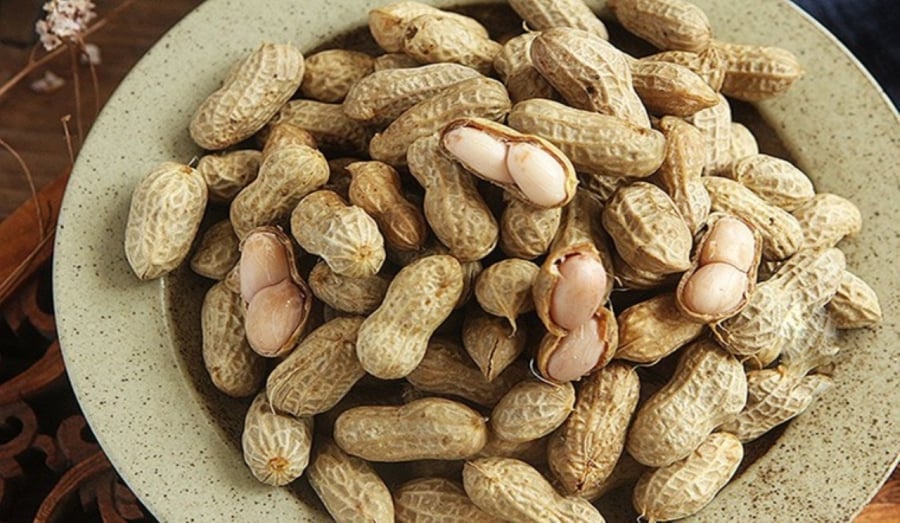Benefits of Peanuts
In 2021, a study published in the Journal of Medical Stroke indicated that appropriate daily peanut consumption could prevent ischemic stroke and cerebrovascular disease.
The research found that regardless of gender, those who ate 4-5 peanuts daily had a 16% and 20% lower risk of stroke and cerebrovascular disease, respectively, compared to non-consumers.

Previous research from Harvard University, published in the Journal of the American College of Cardiology (JACC), also indicated that regularly replacing other refined cereals with peanuts reduced the risk of cardiovascular disease. Thus, peanuts offer definite benefits in preventing cardiovascular disease.
Peanuts are a good source of vitamins B and K, protein, calcium, and other nutrients, and they are rich in unsaturated fatty acids.
Additionally, the glutamic and aspartic acids in peanuts help maintain the brain’s nervous system and prevent vascular diseases. Peanuts also play a significant role in preventing diseases and delaying aging.
The study found that both men and women who consumed 4-5 peanuts daily had a 16-20% lower risk of stroke and cerebrovascular disease compared to non-consumers.
Previous research from Harvard University, published in the Journal of the American College of Cardiology, indicated that regularly replacing refined cereals with peanuts could reduce the risk of cardiovascular disease. Thus, peanut consumption offers definite benefits in preventing heart-related conditions.
Peanuts are nutrient-dense, containing vitamins B and K, protein, and calcium. They are also rich in unsaturated fatty acids, which have numerous health benefits.
Additionally, the glutamic and aspartic acids found in peanuts play a crucial role in maintaining the brain’s nervous system and preventing vascular diseases. Peanuts are also notable for their ability to prevent diseases and delay the aging process.
Note: Who Should Avoid Eating Peanuts
Diabetes Patients: Peanuts are calorie-dense, with approximately 90 calories coming from just 18 peanuts. Therefore, diabetics should monitor their daily calorie intake and avoid overeating peanuts, which can lead to excess calorie consumption.
Digestive Issues: Peanuts have a relatively high protein content, and overeating them can increase stomach burden and cause indigestion.
Liver Disease Patients: Peanuts are rich in fat and protein, which can overload the liver. Therefore, those with compromised liver function should avoid or limit peanut consumption.
Post-Cholecystectomy Patients: Bile, produced in the gallbladder, aids in fat digestion. Without a gallbladder, eating peanuts can hinder fat digestion, so it’s best avoided.
Avoid After Dinner: Peanuts are calorie-dense, and when combined with typical dinner proteins like fish or meat, can lead to excess calorie intake, potentially resulting in obesity.
Cough and Throat Irritation: Chewing peanuts can produce residue that, if inhaled, can aggravate coughing. Additionally, the dry nature of peanuts can worsen a sore throat.
While peanuts offer many benefits, moderation is key. Aim for a daily intake of around 15 grams, or 15-30 peanuts, to maximize their benefits without overconsuming.
The Mighty Cassava: A Tasty Treat with a Healthy Twist
Sweet potato, a starchy root vegetable, is a popular choice for many due to its refreshing taste and perceived health benefits. However, while sweet potatoes are indeed nutritious, it is important to consume them in the right way to avoid any potential health risks. Join us as we delve into the world of sweet potatoes, exploring their benefits and the precautions one should take when incorporating them into their diet.
The Most Stroke-Prone Time of Day, According to Doctors: A Crucial Window of Risk
Stroke is a leading cause of death and disability worldwide, and it is imperative that we take heed of the critical timings throughout the day when our bodies are most susceptible to this life-threatening condition. The following hours, as highlighted by medical experts, are when we need to be especially vigilant about our health and take necessary precautions to safeguard ourselves from the potentially devastating consequences of a stroke.





































